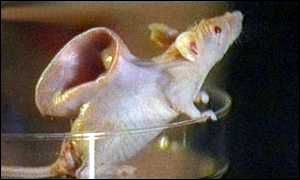Angel Heart
Conservative Hippie
http://www.timesonline.co.uk/tol/news/uk/science/article3204128.ece
January 17, 2008
First animal-human embryo trials to go ahead
Mark Henderson, Science Editor of The Times
Experiments to create Britain’s first embryos that merge human and animal material will begin within months after a Government watchdog today approved two research teams to carry out the controversial work.
Scientists at King’s College London and the University of Newcastle-upon-Tyne will now inject human DNA into empty eggs from cows, to create embryos known as cytoplasmic hybrids that are 99.9 per cent human in genetic terms.
The experiments are intended to provide insights into diseases such as Parkinson’s and spinal muscular atrophy by producing stem cells containing genetic defects that contribute to these conditions.
These will be used as cell models for investigating new approaches to treatment and for improving understanding of how embryonic stem cells develop. They will not be used in therapy, and it is illegal to implant them into the womb.
The decision by the Human Fertilisation and Embryology Authority (HFEA) to grant one-year licences to both teams ends more than a year of uncertainty for the researchers, who first applied for permission to start the work in the autumn of 2006.
Last January the authority deferred a decision and launched a consultation on the issue, which reported in September that the public was broadly supportive. In late November it again delayed ruling because of concerns about procedures for obtaining consent from the donors of the human DNA to be used.
While the HFEA was deliberating, the Government first proposed a ban on the creation of human-animal embryos, also known as “cybrids”, then backtracked after a revolt by scientists.
The creation of human-animal embryos will be explicitly permitted by the Human Fertilisation and Embryology Bill currently passing through Parliament, subject to HFEA licensing. An amendment that would have blocked such research was defeated in the House of Lords on Monday by a majority of 172.
Stephen Minger, who leads the King’s team, said yesterday he was delighted that he would finally be able to start the experiments. “I am pleased that the HFEA has finally after a year and a half realised the importance that the work that we and the group from Newcastle have been licensed for,” he said.
“I am grateful to the scientific community, patient organisations and disease charities for all of the support we have received over the past 18 months. Their backing has been invaluable. This shows that the scientific community can be involved in and influence government policy.”
Lyle Armstrong, who leads the Newcastle group, said: “The award of the HFEA licence is great news. We initially applied for approval to use cow eggs as a means to understand the way they can convert skin cells into embryonic stem cells. Finding better ways to make human embryonic stem cells is the long-term objective of our work and understanding reprogramming is central to this.
“Cow eggs seem to be every bit as good at doing this job as human eggs so it makes sense to use them since they are much more readily available, but it is important to stress that we will only use them as a scientific tool and we need not worry about cells derived from them ever being used to treat human diseases.”
The HFEA has attached conditions to each of the one-year licences but these are not expected to be a barrier to either research project.
The Newcastle group has been asked to provide patient consent forms and to obtain approval from the university’s ethics committee before working with DNA from donated skin cells but it has been cleared to start work immediately using DNA from the UK Stem Cell Bank.
It had originally proposed to use human tissue from a commercial US bank but this was rejected because the donors had not given explicit consent for their cells to be used for making cloned embryos that would be destroyed in experiments.
The King’s licence requires Professor Minger to complete an HFEA training course, which is a formality as he has previously held similar licences. It also requires approval from a local ethics committee before work can begin, which is expected to be granted now the HFEA has ruled positively.
Some critics of cybrid embryos have argued that their use is no longer necessary, given the recent development of a reprogramming technique that can turn back the clock on adult tissue to make “induced pluripotent” stem cells with embryo-like properties, but the HFEA licence committee rejected this.
“The committee considered the emergence of new technologies for reprogramming adult somatic [non-reproductive] cells and agreed that, while very promising, these new technologies do not obviate the need for the basic research into differentiation of pluripotential embryonic stem cells as proposed in this application,” it said.
The decision was welcomed by independent stem cell expertts. Professor Robin Lovell-Badge, of the National Institute for Medical Research in London, said: “The HFEA’s decision is excellent as it adds to the arsenal of techniques UK scientists can use to provide understanding and eventually develop therapies for a wide range of devastating genetic diseases.
“The cloning method allows a patient’s cells to be reprogrammed back into early embryos from which valuable embryonic stem cells can be isolated, and it is the latter that will be studied. While scientists may prefer to use human eggs, these are in short supply and preference should rightly be for their use in treating infertility.
“It is logical to use animal eggs to refine techniques, provide knowledge of reprogramming and early development, and understanding of disease mechanisms. Furthermore, while there are new methods of reprogramming adult cells back to pluripotent embryonic stem-like cells, namely induced pluripotent stem cells, it is important to pursue all avenues as we cannot know in advance which will succeed. Besides, a comparative approach often reveals the most.”

